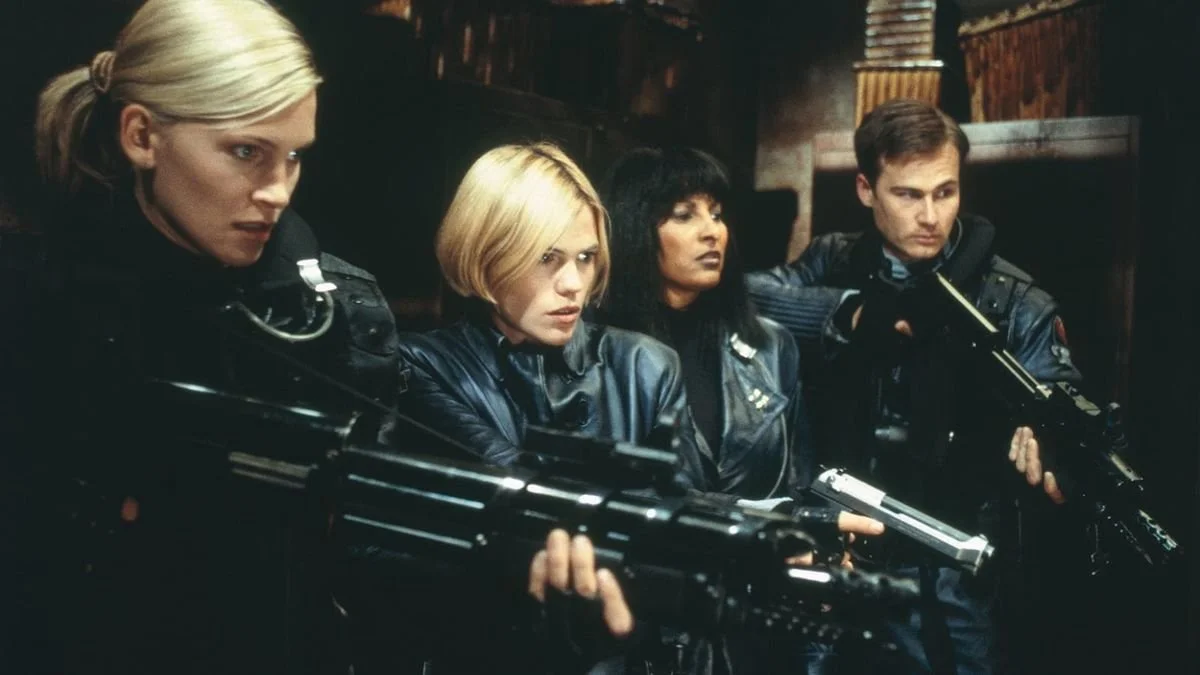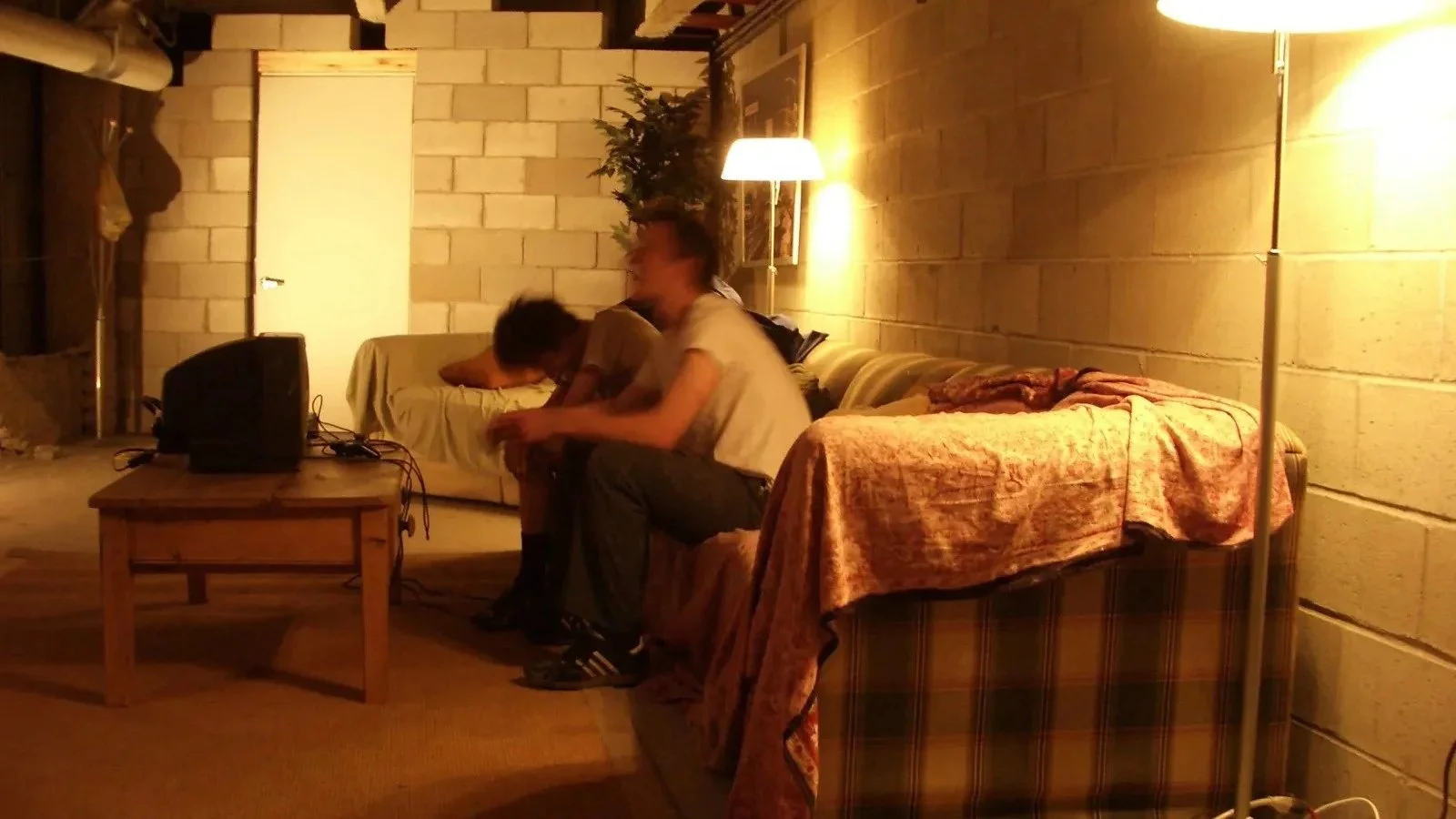Halloween Horror: Ghosts of Mars (2001)
Where do I turn in my cinephile card for admitting that Ghosts of Mars, John Carpenter’s much-derided vampire horror movie set on Mars, is actually a hoot? Sure, there’s goofy acting, some groanworthy repartee between Jason Statham and Natasha Henstridge as two of the police officers at the centre of the film, and subpar special effects. But like another much-derided science-fiction film from the early 2000s, The Chronicles of Riddick (2004), there’s a stilted charm to this sci-fi riff on Howard Hawks’ Rio Bravo and Carpenter’s own Assault on Precinct 13.
The set-up is effective, if weird. In the 22nd century, Mars is now a mining colony in the midst of terraforming. A band of police officers (Natasha Henstridge, Jason Statham, Clea DuVall, Pam Grier) arrive at a remote outpost to pick up a criminal, Desolation Williams (Ice Cube), from the local jail. But when they arrive, the town is deserted and there’s evidence of horrifying murders throughout the settlement. By the time they reach the jail and find the prisoners abandoned by their wardens, they have become the targets of a crazed mob possessed by the spirits of vengeful Martians of the past. The cops, now working with the criminals, have to survive until their train arrives in the hopes they can get out of town alive.
If you’ve seen Assault on Precinct 13, you’ll know the narrative set-up in Ghosts of Mars is almost identical to that film: cop and criminal forced to band together to survive wave after wave of bad guys until they can get out of Dodge. Assault on Precinct 13 took inspiration from Howard Hawks’ Rio Bravo, which synthesized a bunch of different Western tropes from the previous decades. Regardless of where this narrative approach originated, it’s an effective one, setting up a ticking clock that keeps the momentum constantly moving, and providing an ever-constant threat to the characters, one that is seemingly impossible to overcome. Carpenter is great with unrelenting villains, whether Michael Myers, the alien in The Thing, or the forces of Satan in Prince of Darkness. He thrives on having characters dealing with hell (and Hell) and being forced to go through or perish.
Of course, Ghosts of Mars lacks the elemental elegance of Assault on Precinct 13 or Halloween. Unlike in Assault on Precinct 13, we get too much exposition about what is causing all these miners to become possessed by the ghosts of Martians. It’s too bad that Carpenter didn’t repeat the approach of his earlier film and simply let the cause of the villains remain a mystery. Only their unrelenting fury is what matters, providing a constant danger to our characters who have to run and gun from one part of the town to the other, all while figuring out a plan to escape once the train arrives.
The narrative elements of the Martian past also raise questions about colonization and extermination. But Carpenter has no real interest in interrogating the themes the film hovers around beyond relying on Western tropes. If you’re interested in science fiction literature, you’ll know that Martian colonization is often used as an analogy for western expansion, with native Martians stand-ins for the Indigenous peoples of America, most notably in Ray Bradbury’s The Martian Chronicles. However, if we’re to interrogate the film along these lines, then the resolution becomes strangely pro-colonization, since the Martian ghosts are evil, but Carpenter doesn’t seem all that interested in this line of thinking. As well, the outpost is basically a sci-fi equivalent of a haunted Indian graveyard, so again, Carpenter is more interested in genre tropes than a deeper thematic exploration.
Ghosts of Mars also has a nested narrative structure, where Henstridge’s Melanie Ballard is reporting back to a Martian tribunal about the events in the mining outpost, and we cut back and forth from her report to the events at the outpost. This narrative structure is unnecessary, only present so that Melanie can provide us with exposition when things get too confusing. But the exposition isn’t important. The appeal of Ghosts of Mars is the eerie atmosphere, the unrelenting action, and Carpenter’s own ambivalence towards his characters. Like in almost all his films since Assault on Precinct 13, Carpenter’s camera is constantly moving, providing a voyeuristic energy to what’s unfolding on screen. It’s propulsive and invigorating and oh-so-cinematic, with its emphasis on medium-wide shots and clear blocking that takes advantage of the large set of the outpost town. Ghosts of Mars might be minor Carpenter, but it is a further demonstration of his undeniable style and cinematic signature. It’s auteur cinema through and through.
The film’s design is also intriguing, almost more so now that it seems decidedly strange and uncanny compared to the Apple store sheen of so many contemporary science fiction works. The Mars of Ghosts of Mars is dirty and untamed, more reminiscent of the lived-in future of Star Wars and Alien than the pristine worlds of Star Trek. The technology is lumbering. Guns are still guns. Trains are still trains. The Western elements are present, but even the futuristic stuff within the film, whether the mining equipment or other bits of technology, seem to belong to an ancient past as much as a far future. There’s weight to everything tangible on screen, even if the CGI is particularly weightless in that early 2000s way. However, even the poor special effects give the film an uncanniness that plays into the haunted atmosphere of the film.
It’s too much to say that Ghosts of Mars is a movie that coasts on vibes—there’s too much running and gunning and too many one-liners, like so many conventional Hollywood pictures, to work as the kind of stylistic exercise you get in the 2020s, or even Carpenter’s own works like Halloween and The Fog. But its atmosphere is palpable and intriguing, genuinely eerie in a way we rarely get in modern, more accomplished, horror pictures. In many ways, the film might be Carpenter running on fumes as a director, but there’s still some potency to Carpenter’s particular alchemy of action and mood, even in diluted form.
6 out of 10
Ghosts of Mars (2001, USA)
Directed by John Carpenter; written by John Carpenter and Larry Sulkis; starring Ice Cube, Natasha Henstridge, Jason Statham, Pam Grier, Clea DuVall, Joanna Cassidy.



Joe Carnahan’s cop thriller starring Matt Damon and Ben Affleck is an enjoyable whodunnit.